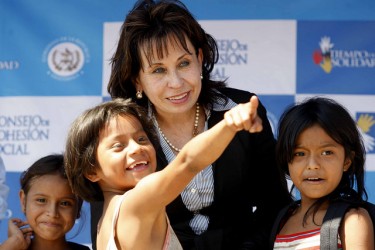
Picture under a Creative Commons License Attribution, Non Commercial, Share alike by Guatemalan Government.
Intolerance was exhibited through social media when the President's wife, Sandra Torres, announced she will lead the official party in the run for the Presidency. But these comments are not new; words of disapproval and hate by her critics were spread long before she announced her candidacy.
On Facebook there are at least two pages directed against Torres: one for people who hate Sandra Torres [es] and another page for those that reject her candidacy [es] –the latter with more than 21,000 “likes.” On Twitter, the same sentiment is expressed under the hashtag #novotoporSandraTorres (I will not vote for Sandra Torres). Comments on Facebook and Twitter are centered on her looks, her “evil intentions” and how she could become a Guatemalan version of Argentine Evita Perón.
Critics on blogs have focused on two topics: the Social Cohesion programs she has led, and an Article in the Guatemalan Constitution which would prohibit her candidacy.
Her social programs
El Crunch Chapin [es] strongly criticized her social programs and said he would rather vote for Laura Bozzo, the Peruvian talk show host in ‘Laura in America’, than for her.
Cierto, las dos son unas “mujeres del pueblo” pero a diferencia de la esposa del presidente, Laura Bozzo en su programa no les regala una bolsa solidaria a la cada persona de la clase baja. Ella en cambio les da un CARRITO SANWICHERO. Lo que significa que en ves de regalarle las cosas, así por así, les da trabajo para que esta gente solita salga adelante y no se acostumbre a vivir de promesas vacías.
There are legitimate concerns that she will abuse her position as the leader of the Council of Social Cohesion and that she will force people to vote for her. The blog Santa Cruz Barillas [es] reports that some people from Northern Guatemala were mislead when members of the first lady's staff warned them that they have to vote for her if they want to keep their social benefits. Unfortunately, connectivity in rural areas is extremely slow and incidents like these are only reported by small digital news outlets like the blog Santa Cruz Barillas [es].
However, it is important to note that other candidates have stated that they will continue these social programs.
A constitutional impediment
Journalist José Valdizán comments that the Constitution forbids [es] the president's relatives to become President. However, he also adds that the Constitutional Court might interpret the text in a flexible way, authorizing her to participate in the election, as it did in the past with former dictator Efraín Ríos Montt. Such views are shared by Luis Figuero in Carpe Diem who also highlights her poor results in a recent poll that gave her only 11% of votes.
Mike at Central American Politics explains,
On the one hand, the constitution prohibits a Torres candidacy because she is a close relative of the president (Article 168). On the other hand, Torres’ lawyers can claim that she is allowed to run because the constitution has another clause that guarantees the rights of all to participate in the elections. You can't prohibit someone from running for the presidency because a close relative of theirs had previously occupied the post (Washington Post). (Sorry, you just can't say that my lawyers told me it was legal. Where have we heard that one before?)
Neither President Colom nor Sandra Torres have said much about the constitutionality of her candidacy other that it's not a concern. The Guatemalan constitutional court, however, will most likely have to determine whether Torres can run.
Sandra Torres has a vast number of supporters from underprivileged sectors. But those supporters will hardly have a voice and a space in social networks. Connectivity in Guatemala is as low as 10% and only few households in rural areas own a computer. Furthermore, indigenous communities are easily reached by radial spots in their language. During the elections, the campaign will be very different online and offline.







3 comments